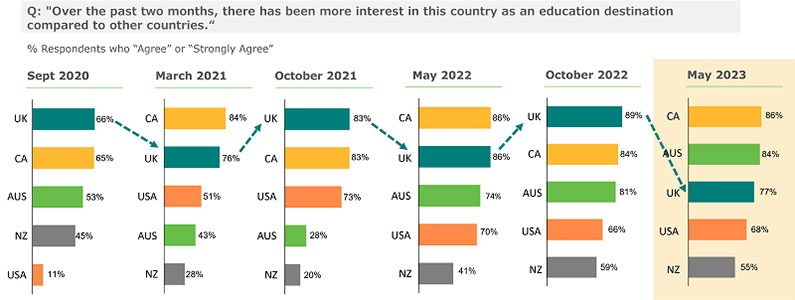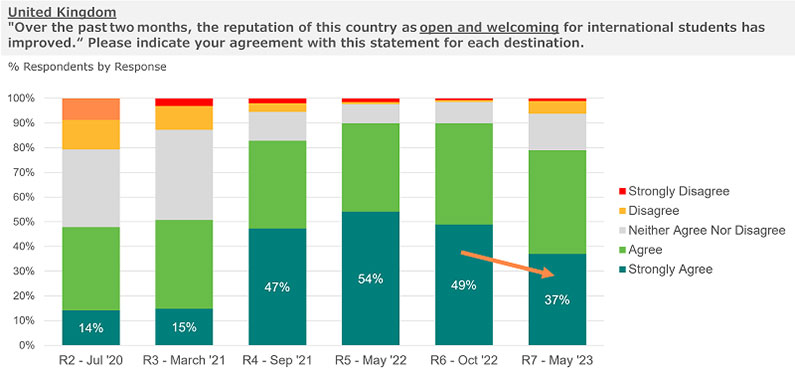UK popularity slips as policy changes shift student interest to alternative destinations

The United Kingdom has slipped to third on the list of preferred destinations for international students according to the results of the latest Navitas Agent Perception Survey.
The biannual survey – now in its seventh iteration – received responses from almost 1000 agents globally. These agents were asked to consider whether student interest in studying in the five major education destinations – Canada, Australia, USA, New Zealand and the UK – had increased in the eight weeks prior to the survey release.
Since the first survey in May 2020, the appetite for study in the United Kingdom has fluctuated from a low of 66% (Sept 2020) to a peak of 89% (Oct 2022), however, the May 2023 marker revealed that just 77% of agents agreed there had been increased interest, a down-swing of 12% (see Figure 1). As a consequence, the United Kingdom now sits below Canada and Australia in the pecking order, with those two nations recording slight upticks in interest from those seeking education abroad.

Pauline Bedford, Navitas’ General Marketing and Recruitment Manager, University Partnership’s Europe, attributed the slide in student interest to a combination of tougher government policy around immigration and other macro-economic challenges such as increased cost of living and employment opportunities post-graduation. However, rather than be downcast about the recent shunning of the UK as a preferred destination, Bedford believes the survey insights serve as a timely reminder to education industry participants that quality and care remain of utmost importance.
“As we navigate our way through the recently announced government policy changes in the United Kingdom and recognise the global impact arising from the increased cost of living, listening to the needs of our future students through the voices of our valued partners has never been more important,” she said.
“Whilst it’s clear that these external forces are influencing the way in which the United Kingdom is perceived, there is a strong message that students continue to be attracted to the high quality of education offered.
“Students look to those providers who can demonstrate real value for money, enhanced levels of social, mental and academic support, and pathways to employment.”
The policy reforms highlighted by Bedford include tougher course entry conditions, a block on students being able to switch into employment routes prior to completing their studies, and restrictions on dependents such as spouses or children being able to join student migrants in the United Kingdom unless they are on a postgraduate research route.
These government measures – aimed at curbing net migration to the United Kingdom which has surged since early 2021 – have signaled a less welcoming stance for student migrants with the flow on effect raising concerns amongst UK universities and education providers that their diversity and reputations as global leaders in education could be significantly undermined. This is reflected in agent responses to the Navitas Agent Perception Survey on the question regarding whether a country’s reputation as open and welcoming had improved. As the figure below shows, there has been a clear decline in the proportion of agents that agree with the sentiment that the UK is open and welcoming.

Bedford suggested that to reduce the possibility of negative impacts on the welfare and academic performance of international students, educators like Navitas now had an increased obligation to foster student wellbeing and work diligently to rebuild positive sentiment in the international education sector across Europe and the UK.
You can view the full results of Round 7 of the Navitas Agent Perceptions Survey here.